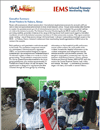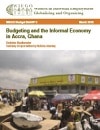
All posts in Africa
-
Research Reports
Structural Adjustment Programmes and the Urban Informal Sector in Ghana
Issues in Development, Discussion Paper, No. 3
Read More -
Books & Book Chapters
Organising the Informal Economy: Results and Prospects. The Case of Ghana in Comparative Perspective
Abstract:
Read More -
Books & Book Chapters
Women leaders and the sense of power: clientelism and citizenship at the Dantokpa market in Cotonou, Benin
Abstract:
Read More -
Journal Articles
“You just look at our work and see if you have any freedom on earth”: Ghanaian women’s accounts of their work and their health
Abstract: Research on women’s health in the developing world has focussed on reproductive issues and has defined women primarily as...
Read More -
Research Reports
Technical Memorandum: United Republic of Tanzania labour administration and inspection audit
Read More -
Research Reports
Paid Work, Women’s Empowerment and Inclusive Growth: Transforming the Structures of Constraint
This research paper examines the extent to which the structure of economic opportunities generated by a country’s growth strategies...
Read More -
Research Reports
Women Working in the Informal Sector in Africa: New Methods and New Data
Paper prepared for the United Nations Statistics Division, the Gender and Development Programme of the United Nations Development Programme...
Read More -
Journal Articles
The Informal Sector, Productivity, and Enforcement in West Africa: A Firm-level AnalysisReview of Development Economics
This article is included in a special issue of the journal which includes 11 articles focused on informality.
Read More -
 Research Reports
Research Reports
Executive Summary – Informal Economy Monitoring Study: Street Vendors in Nakuru, Kenya
The Informal Economy Monitoring Study (IEMS) is designed to provide in-depth understanding of how informal workers are affected by and respond...
Read More -
 Budget Briefs
Budget Briefs
Budgeting and the Informal Economy in Accra, Ghana
About 86 per cent of Ghanaian workers work in the informal economy but together they earn only 40 per cent of national income. This is because...
Read More